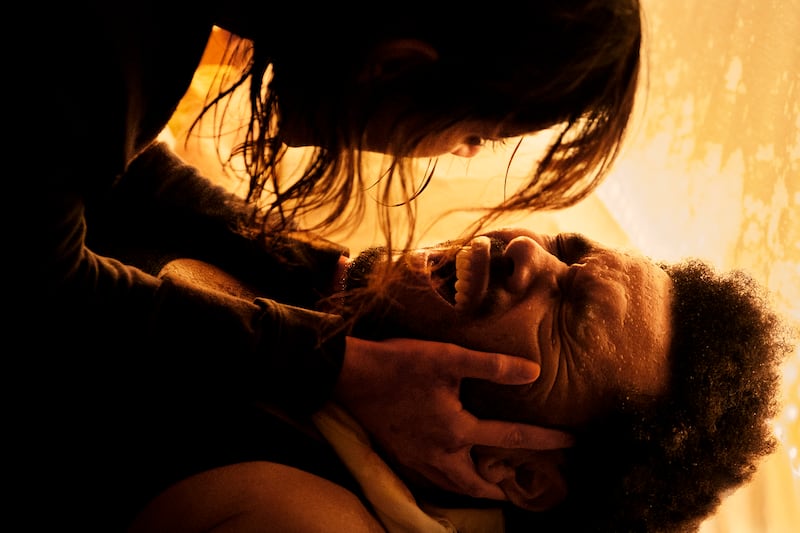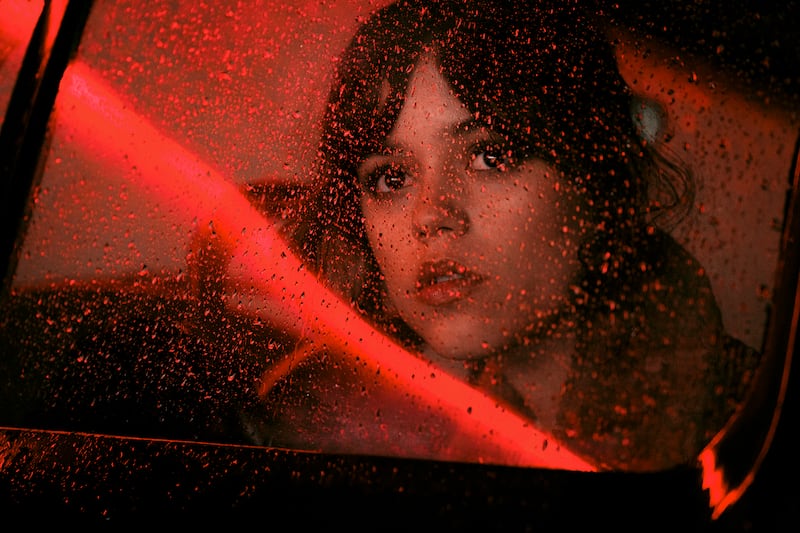Abel Tesfaye, aka the Weeknd, may be a charismatic singer-songwriter, but he’s a severely bland screen presence, as he demonstrated in 2023’s HBO flop The Idol and now reconfirms with Hurry Up Tomorrow.
Despite its title, Trey Edward Shults’ theatrical companion piece to the Weeknd’s 2025 album of the same name moves at a snail’s pace. Were that its only shortcoming, A vanity project that’s pointless, redundant, and infinitely more satisfied with itself than anyone else will be, it’s a feature-length ego-stroke of monumental hubris that instantly assumes pole position in the race for year’s worst movie.
Hurry Up Tomorrow, which is now in theaters, begins and ends with a close-up of Abel (playing a fictionalized version of himself) backstage at an arena where he’s set to perform, and that circular structure is apt given that the film goes nowhere interesting before arriving back at its start.
Though he’s set to entertain thousands, Abel is consumed with thoughts of a voicemail from a mysterious flame who tells him “I’m leaving you” because “you’re not a good person” and “you deserve to be alone.” Even so, he doesn’t let his sorrow over this woman (who won’t return his texts and phone calls) interfere with his show, and during his opening number, he confidently runs through “Wake Me Up” while drenched in red light—a hue that’s associated with the artist throughout, and proves to be one of the material’s numerous recurring motifs.
Abel hits the stage in a boxer’s robe after having thrown a few warm-up punches with his manager Lee (Barry Keoghan). Still, he’s less a fighter than a morose lover, and his attitude in Hurry Up Tomorrow veers from mopey to tormented to mopey again. As he preps for his concert, Hurry Up Tomorrow depicts Anima (Jenna Ortega) sobbing as she pours gasoline in every room of a house that she subsequently torches, driving away in a van as smoke billows over the snowy horizon.

Anima is an enigma who steals fuel at a gas station and makes lots of pouty faces. As the film will eventually make clear, she shares a deep connection with Abel—meaning, they both love to cry at every possible moment, whether they’re hysterically wailing or allowing one solitary tear to roll down their cheeks from the corner of their eye (another ceaseless motif!).
Abel visits a specialist about a vocal cord strain and is informed that it’s a psychological malady caused by stress. At the concert Anima attends, the singer loses his voice mid-performance—an echo of the real-life 2022 SoFi Stadium show Abel had to cut short when he could no longer effectively croon his hits.
In response, he takes off, and on his way out of the building, he runs into Anima, whom he decides to take along on his impulsive flight from the spotlight, responsibility, and his broken-hearted misery. Donning translucent masks, they head to the Santa Monica Pier to enjoy Pacific Park’s roller coaster, ferris wheel, and air hockey tables, after which they retreat to a hotel where Abel plays Anima a new, unfinished track, and she remarks that it’s (figuratively) about her. She then recounts her rough childhood with a father who abandoned her and a penniless mother she fled, all of which taught her that “I am so f---ing alone. I can’t escape it.”
To say that this is a lot of boo-hoo gibberish would be an understatement. Hurry Up Tomorrow doesn’t imagine either Abel or Anima as real people; they’re merely music-video ciphers designed to strike poses and superficially emote.
Shults, Tesfaye, and Reza Fahim’s script is a collection of loosely connected incidents that the director embellishes with extreme self-conscious stylization. Strobe lights, color filters, and helter-skelter editing are all part of the proceedings’ aesthetic overload, as is a soundtrack that—when not playing the Weeknd tracks—is awash in howling cacophony.
More insufferable, though, are Shults’ preferred formal tricks: zooming rapidly down hallways and at rear car windshields, and rotating his camera around his characters, the latter of which occurs approximately 463 times during the film’s 105 minutes, making it feel as if we’re watching Abel and Anima from the vantage point of a merry-go-round.
As the doting Lee, Keoghan is all coke-snorting hype-man bluster, while Ortega mostly looks wide-eyed and dreamy—and, later, wide-eyed and deranged—as Anima. The morning after a night spent with Abel, Anima endures a phone call from her furious mother and lashes out at Abel, whose prior sweetness has given way to I-gotta-run curtness.
When Abel fails to provide Anima with the “truth” she demands, she takes drastic measures that hurl Hurry Up Tomorrow into quasi-thriller territory. Shults, however, doesn’t care about suspense, continuing to fashion each second as a look-at-me showcase for his own talents, highlighted by a prolonged dream sequence whose images more than faintly recall The Shining and 28 Days Later (albeit with symbolism, such as red stop lights, that neither predecessor would dare touch).

Abel’s quest involves literally rediscovering his voice, yet Hurry Up Tomorrow has nothing to say about the themes (estrangement, grief, heartache, emptiness) that it trots out at every turn.
Instead, it’s just a work of grand self-indulgence, complete with Abel bragging about how late in the day he eats breakfast (apparently, 4 pm isn’t his record!) and a finale in which Anima critiques some of the Weeknd’s music, praising “Blinding Lights” and cutting down “Gasoline”—a scene of self-flagellation that simply enhances the film’s over-the-top narcissism. Ortega complements her reviews by lip-syncing to said cuts and dancing about with ill-fitting enthusiasm, and the incongruous awfulness of her routine feels, after so much nonsense, perfectly fitting.
Cinema is rife with vain follies such as Hurry Up Tomorrow, but few have been as painfully dull as the one Shults and Tesfaye craft for the latter. The more the director gazes at his subjects, the less he reveals. More frustrating, he generates no electricity from the brief instances in which his star is in his element, be it in front of throngs of adoring fans or at a nightclub where everything is shot and cut with typical frenzied hysteria. A weepy, ponderous, back-patting affair, it’s the polar opposite of a banger.









